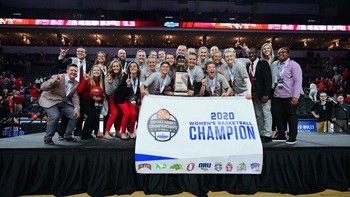USD professors discovery earns praise from science magazine
In 1996, Timothy Heaton, Ph.D., chair and professor of the department of Earth Sciences at The University of South Dakota, was excavating fossils inside the On Your Knees Cave, which is located on Prince of Wales Island in southeast Alaska. During the excavation, Heaton discovered a skeletal jawbone, remains that were determined to be of human origin. Although Heaton’s main area of focus was researching fossil animals from the Ice Age, an article he co-authored last year that provided detailed information about the find which resulted in scientists extracting human DNA from a 10,300-year-old tooth, was recognized by Discover magazine as the No. 32 (out of 100) top science story for 2007 (http://discovermagazine.com/2008/jan/tooth-dna-dates-the-first-americans).
"Without expecting it, I dug up a human jawbone," recalled Heaton, who noted that On Your Knees Cave was a small, interglacial cave located in a very remote region on Prince of Wales Island. "The data gathered from that find lends plausibility to the idea that the first Americans migrated along the coastline."
Although he had been excavating in caves since 1991, no find was more significant than this. In fact, Heaton’s discovery is considered "genetic gold," as it’s the oldest genetic sample ever recovered in the Americas and supports the scientific theory that humans first arrived in North America about 15,000 years ago. His documentation of the ground-breaking Prince of Wales Island research has been featured in several prominent scientific publications, including a 2000 profile in National Geographic and a 2004 article in Smithsonian magazine entitled, "America’s First Immigrants."
"It’s been very interesting research, to say the least," noted Heaton, who enthusiastically explored caves as a teenager. "We were able to gather a lot of information despite working in remote, basically unexplored areas."
In addition to his own research as well as working with scientists and researchers from around the world, Heaton and USD undergraduate students have spent a total of six summers excavating caves on Prince of Wales Island thanks to two National Science Foundation research grants totaling more than $300,000 each and four National Geographic Society research grants ranging from $7,000 to $20,000. Among the discoveries were bear bones as old as 35,000 years, a 26,000-year-old caribou antler and remnants of sea birds. Also found were spear points, microblades and concentrations of charcoal leading Heaton and other researchers to believe that humans ventured to the caves to “smoke out” hibernating bears.
"It turned out that (On Your Knees Cave) was a ‘hot spot’ during the Ice Age," explained Heaton, who has cataloged more than 45,000 fossils from the site. "We’ve spent several summers on other Alaskan islands hunting for another cave like On Your Knees Cave, but so far we’ve come up empty. It’s a one-of-a-kind site in a very remote area."
A well-documented Web-site featuring Heaton’s work in the Alaskan caves can be found at www.usd.edu/esci/alaska/intro.html, including detailed information on how the scientists and researchers maneuvered through the difficult limestone topography as well as research results from the various finds (www.usd.edu/esci/alaska/research.html). Those finds have drawn the interest of the scientific world as well as generated a lot of positive exposure for the science departments at USD, particularly programs where students have an opportunity to analyze Heaton’s extraordinary catalog of research.
"This recognition of Dr. Heaton’s work by Discover provides yet another example of the groundbreaking research carried out by faculty at The U," added Christina Keller, Ph.D., associate dean of the College of Arts and Sciences at USD. "The Discover announcement is exciting not only for our institution, but for the numerous undergraduates who have participated with Dr. Heaton in collecting fossils in On Your Knees Cave and can now say they were part of one of the most important scientific stories of the year."


